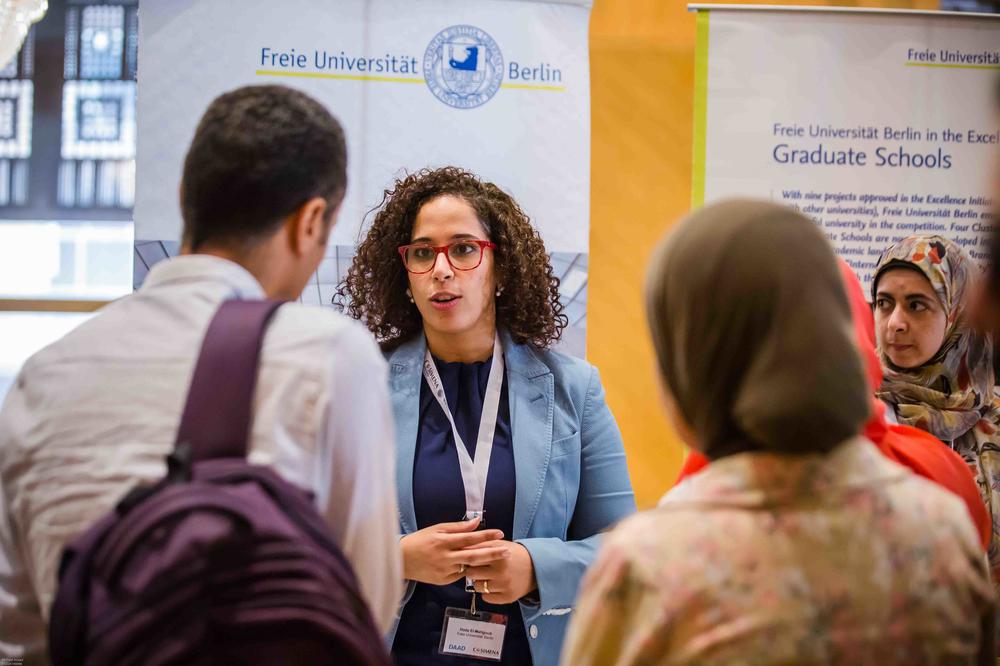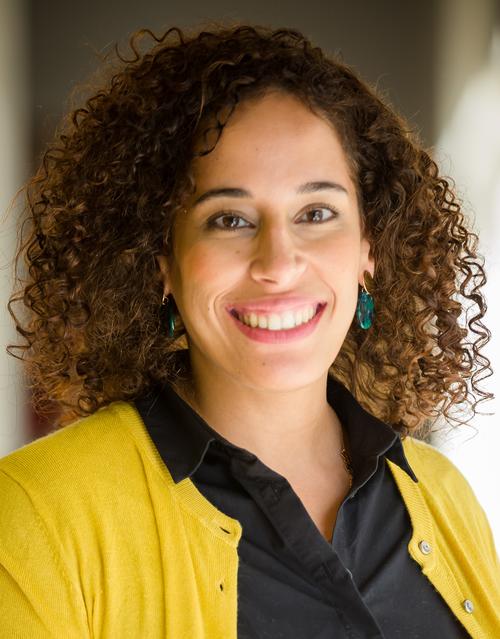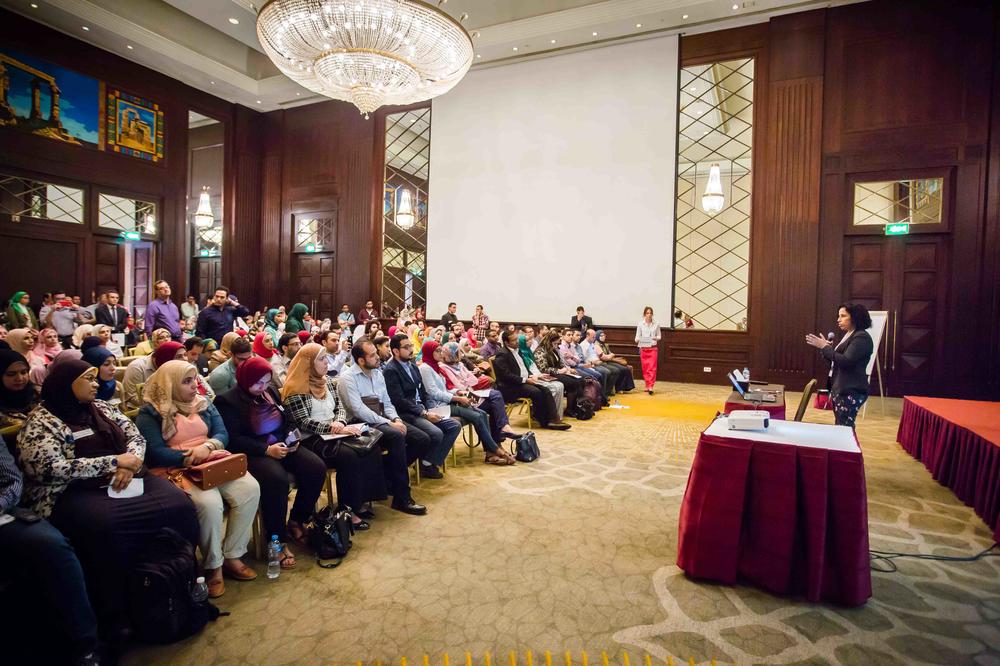Academia in Egypt Often Underestimated in the West
Ten-year Anniversary of the Cairo Office of Freie Universität Berlin / Online discussion on October 13, 2 p.m.
Oct 08, 2020
Hoda El Mahgoub, head of the Cairo Office of Freie Universität Berlin, at an information stand.
Image Credit: DAAD Cairo Office
Dozens of students with bachelor’s and master’s degrees, more than 100 doctorates: In the past decade, many Egyptians have studied at Freie Universität Berlin. Egypt, in the heart of the Arab world, is one of the most important places in the international network of Freie Universität. Numerous students from Berlin have also studied at universities in Egypt. The intensive exchange is facilitated by the Cairo Office, which is now celebrating its tenth anniversary.
To mark the anniversary, the Cairo Office is organizing an online discussion on international academic cooperation. Professor Verena Blechinger-Talcott, the vice president of Freie Universität Berlin responsible for international affairs, as well as representatives of leading universities in Cairo, Alexandria, and Beirut will take part.
“Germany is a dream destination for many Egyptians,” says Hoda El-Mahgoub. A trained pharmacist, El-Mahgoub has headed the Cairo Office since the beginning of 2018. She provides information about studying and doing research at Freie Universität at numerous events in Egypt. She also offers individual advice and support in obtaining visas. She points out that many Egyptians find it particularly important that Freie Universität perfomed extremely well in the German government’s three Excellence competitions for universities as well as in many international rankings.
Hoda El Mahgoub has headed the Cairo Office of Freie Universität since the beginning of 2018.
Image Credit: Cairo Office of Freie Univeristät Berlin
Academic freedom at German universities is an important aspect, especially for research and teaching in the humanities and social sciences. In Germany, research is possible on topics that are politically too sensitive in Egypt. But there is also great interest from Egypt in the natural sciences.
The subject with the largest number of Egyptian doctoral candidates at Freie Universität is veterinary medicine. Many Egyptians who are interested in studying or doing a doctorate in Germany initially shy away because of their lack of knowledge of German, says Hoda El-Mahgoub. “The reputation has lingered: if you don't speak German, you can’t study in Germany,” she says. That is wrong, however, as the statistics alone show. “I often point out that a third of doctoral candidates at Freie Universität come from abroad: one fifth of the entire student body is not German,” she says. “Internationality is part of the university’s self-image.”
Worldwide Network
The office in Cairo is part of a global network of Freie Universität. Four other offices are located in Moscow, New Delhi, Beijing, and São Paulo. “When Freie Universität developed the concept of liaison offices in 2007, it was clear from the start that an office should be opened in the Arab world. After all, the university is involved in North Africa and the Middle East in many ways and with a wide range of subjects,” says Dr. Herbert Grieshop, director of the Division of International Affairs at Freie Universität.
The Egyptian metropolis has an academic tradition radiating throughout the Arab world. The location was also chosen because the office was able to move into the premises of the liaison office of the German Academic Exchange Service (DAAD), with which the university works closely.
Building Networks and Stimulating Cooperation
Freie Universität has been involved in more than 80 third-party funded projects in Egypt over the past decade. With its network in Cairo and the region, the liaison office in Cairo not only provides logistical support for researchers from Germany, but also encourages new collaborations.
In particular, scholars from the West who do not deal with Egypt professionally often underestimate science and academic in Egypt, says Hoda El Mahgoub. “Egypt is not a developing country in science and scholarship,” she says. Anyone who travels there will notice that quickly. The Cairo Office invites professors from Berlin to events in Cairo such as the DAAD’s Day of German Science. There they can hold lectures and conduct discussions with researchers and students. “That is a good opportunity to experience the potential that lies in this country,” says Hoda El Mahgoub.
Every year the Cairo Office informs hundreds of Egyptian students who want to apply for a degree program or a doctorate in Germany. Currently, events like this one (from 2018) have to take place online.
Image Credit: DAAD Cairo Office
Florian Kohstall, who holds a doctorate in political science, headed the Cairo Office from its inauguration in October 2010 until the beginning of 2018. He recalls how eventful the past ten years have been in Egypt. Currently, Kohstall heads the Global Responsibility program from the Berlin campus of Freie Universität. In addition to programs for refugee students and scholars, the program is responsible for establishing the Berlin Center for Global Engagement as part of the Berlin University Alliance.
“In particular, in times of crisis it becomes clear how important it is to maintain contact with local scholars and scientists through a liaison office. Cairo is a very good example of this,” says Florian Kohstall. “The Cairo Office has seen numerous upheavals since the so-called Arab Spring in 2011, and it has continuously helped to intensify exchange between Freie Universität and Egypt.”
Impact on the Region
In the future, Hoda El Mahgoub wants to make the Cairo liaison office even more visible in the region. She plans to strengthen existing contacts in Lebanon and to establish new ones in other countries in the Middle East and North Africa. She points out that Egyptian universities outside the metropolitan region of Cairo also have enormous potential for academic exchange.
The pandemic is currently making work there difficult. Information events can also be held digitally, but that is not a good substitute. “It makes a huge difference to have a real person sitting in front of you,” says Hoda El Mahgoub. “I can't wait to meet again under normal circumstances.”
The original German version of this article was published on October 7, 2020, in campus.leben, the online magazine of Freie Universität Berlin.
Further Information
Discussion Event as part of Tenth Anniversary: “International academic collaboration: The back door remedy to a global crisis?!”
Keynote: Prof. Dr. Verena Blechinger-Talcott, Vice President, Freie Universität Berlin
Discussion wiht Prof. Dr. Abdel Meguid Kassem (Cairo University); Prof. Dr. Georg Marquis (American University in Cairo); Prof. Dr. Hesham Gaber (Alexandria University); Isabell Mering (Cairo Office, DAAD); Prof. Dr. Lina Choueiri (American University of Beirut); Prof. Dr. Verena Blechinger-Talcott (Freie Universität Berlin)
Moderated by Hoda El Mahgoub (Cairo Office, Freie Universität Berlin) and Dr. Florian Kohstall (Head, Global Responsibility, Freie Universität Berlin). The event will take place in English.
Time and Location:Tuesday, October 13, 2020, 2:00 p.m., online.
If you wish to attend, please register here.



